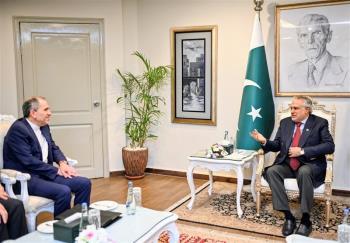Alwaght- Turkey’s former Foreign and Prime Minister Ahmet Davutoglu said on Friday he officially launched his “Future Party.” With regard to the place and significance Davutoglu has in the ruling Justice and Development Party, or AKP, the foundation of a new party will be influential in the country’s power and political order.
Erdogan’s former friends
Turkey, a country with various identities and ideals, vacillated between various values from the 1970s to the 1990s. Finally, the AKP developed an understanding of the political taste of the people of Turkey and mixed it with the requirements of global politics to put the country on an all-new track.
Mixing Islamist and liberal discourses into a national political container, the AKP from 2002 to 2010 created a golden political and economic era for Turkey. The party largely owed its success to a number of members. Recep Tayyip Erdogan, the current president, and Abdullah Gul, the former president, drew the lines of the home policy.
Economically, Ali Babacan emerged as a mastermind of the new economy that went competitive and attracted foreign investment and promoted trade thanks to his theories and guidelines. He served as the deputy prime minister and minister of the economy before he resigned in early July. Babacan was a heavyweight of the liberal camp within the AKP and played a considerable role in drawing Turkey close to the European Union.
Ahmet Davutoglu designed the country’s foreign policy and raised a need for Turkey to broaden its “strategic depth.” During his service, he managed to explain a balanced role for the Turkish foreign policy enabling it to simultaneously work with different players like the EU, China, and Russia.
Since 2010, cleavages within the AKP and mainly among the founding fathers appeared to strike the ruling party. But the gaps required some political quakes to get clear to the public. The failed 2016 military coup against Erdogan, the 2018 presidential elections, and then the municipal elections of this year in which Erdogan sustained a major loss by losing main cities, all put Erdogan’s old friends on stances mainly non-compliant, if not clashing, with his.
New opposition rises from the heart of AKP
Davutoglu had a special attachment to the AKP and his separation from the party came in stages and initially started with soft criticism. When he was PM, he conflicted with Erdogan over such issues as the constitutional reforms and shift to the presidential system. The gaps with Erdogan were enough for him to be sidelined from politics. But his future party tells about a wider gap and new groupings in the nation’s politics. He unveiled the plans for the new party in a 143-page book.
He is the architect of new Turkish policy so his new party’s policy will not differ much from the currently-adopted policy, except for asking for closeness to the NATO and the EU. On home policy, he has deep differences with Erdogan mainly on the constitution and the form of governing. He insists that the country needs a constitution in which marks of the coup-era rule are erased. It should include the whole of the Turkish people with all the differences they have without any fear, any taboos, and any excuse. He also has his idea on the political system arguing that the new political system undermines the parliament which is a dangerous development and Turkey should return to the parliamentary democracy. Such postures are certainly Erdogan’s red lines. A new opposition triangle containing Davutoglu, Babacan, and Gul rose to publicity before the local elections.
Babacan in July left the AKP and his post. He had rejected an Erdogan proposal to be a member of the council of presidential advisors. Shortly after his resignation, Hurriyet newspaper said that Gul and other former Erdogan allies plan to launch a new party after the elections. Other media reports say that Gul plans to run for the 2023 presidential election. Opposition parties have supported the intention, media reports note.
Various levels of confrontation
The new opposition’s confrontation with Erdogan is in the making in a set of levels:
The first level is in the area of personality and charisma. Erdogan, Gul, Davutoglu, and Babacan are popular characters among the public, with services hardly ignorable. Last week, Erdogan called Davutoglu “swindler” as he accused him of swindling in a property and loan case with Halkbank of Turkey. Reacting to the accusation, Davutoglu said that he was ready for a neutral reference to look into his and Erdogan’s property and assets. Babacan talked to a Turkish television saying that the country has entered into a “dark tunnel” and its problems are increasing at all levels every day.
At the level of political groupings, the defectors have acted coordinately. For example, the former chief of Constitutional Court Hasem Gulec, who is retired and rejected an AKP invitation for cooperation, was named as a founder of the party beside Babacan and Gul.
The third level of competition will be over sensitive political posts and places. The new party implied that it will support the Erdogan opposition and very importantly will challenge Erdogan in the next presidential election.
And the fourth level is about the competition of discourses in which Davutoglu is a forerunner compared to the opposition. With a new reading of justice and development, Davutoglu is conceptually deconstructing the key elements of the old party like liberalism and Islamic development to put them in a new discourse. He, for example, told his supporters that the new party wants to bring back democracy based on religious standards.
But Erdogan’s charisma and popularity among the Turkish community’s traditional layers, even among the traditional Kurdish community, is not something easily ignorable. Even the AKP owes its current credibility and vigor to Erdogan. During the crisis with Russia, he restored the common interests with Moscow through artistically handling the case without serious damage to the Turkish relations with a global pole of power. He also made China a crucial trade and investment partner. At the same time, he supported Qatar in the face of Saudi blockade and managed to reverse the US sanctions and currency value fall damages and economic vulnerability by ramping up exports to Qatar. He also successfully handled the case of Syrian refugees and is seeking a safe zone in northern Syria to resettle them.
These facts taken into account, sidelining Erdogan will not be an easy job. Still, experts suggest that serious competitions are expected to start early. Predictions say that the least implication for Erdogan is attracting some of AKP lawmakers to the new party and AKP’s possible loss of parliamentary majority.



























